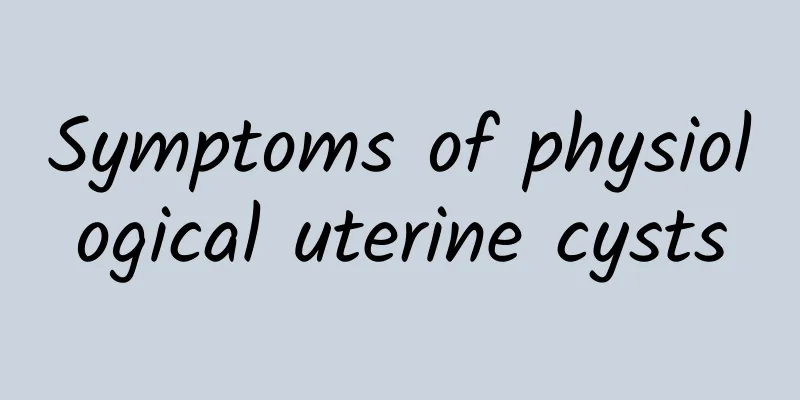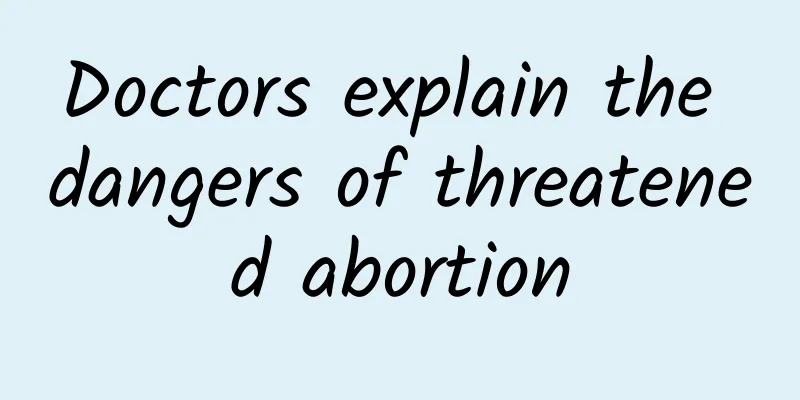Symptoms of physiological uterine cysts

|
Physiological uterine cysts usually have mild or no symptoms, but if you experience abdominal distension and pain, abnormal menstruation, or a lump in the lower abdomen, you should be alert to abnormal conditions and seek medical attention as soon as possible. Regular gynecological examinations and timely attention to changes in symptoms are important means to prevent and detect the deterioration of uterine cysts. 1. Common symptoms Physiological uterine cysts are mostly asymptomatic and may resolve spontaneously within a few months. However, some women may experience the following symptoms: Abdominal discomfort or lower abdominal bloating: When the cyst is large, it will compress the surrounding tissues, causing local discomfort or mild pain. Menstrual disorders: Some women may experience mild menstrual cycle disorders, such as heavy menstrual flow or prolonged bleeding. Feeling of a lump in the lower abdomen: Larger cysts can occasionally cause a lump to be felt in the lower abdomen. 2. Causes of symptoms Uterine cysts are closely related to hormone fluctuations, ovarian ovulation cycles and other female physiological changes. Fluctuating hormone levels: Excessive estrogen production can stimulate the formation or enlargement of cysts. Changes in follicles after ovulation: Some cysts originate from follicular tissue that has not completely degenerated. Local inflammation or metabolic problems: can affect the size and appearance of the cyst. 3. Countermeasures Regular check-ups: Gynecological ultrasound examinations are recommended every year, especially when there are menstrual abnormalities or significant abdominal pain. Medication control: If the cyst is large or symptoms are significant, your doctor may prescribe short-term hormone-regulating medications, such as oral contraceptives, to help control ovarian function. Nonsteroidal anti-inflammatory drugs such as ibuprofen can relieve pain. Surgical intervention: For patients with large cysts or those at risk of malignant transformation, doctors may recommend cystectomy or laparoscopic hysterectomy. 4. Lifestyle conditioning suggestions Diet adjustment: Eating more foods rich in dietary fiber and antioxidants, such as green leafy vegetables, deep-sea fish, and nuts, can help balance hormone levels. Avoid high-sugar and high-fat diets to reduce rapid weight gain. Moderate exercise: Gentle exercises such as yoga and brisk walking can promote blood circulation and relieve local congestion. Emotional management: Anxiety and stress may affect hormone secretion, and maintaining a good mood can help prevent symptoms from worsening. When the above symptoms occur, it is very important to seek medical attention in time. Once the diagnosis is confirmed, follow the doctor's advice for treatment or regular check-ups to effectively manage physiological uterine cysts and maintain health. |
<<: Can I get pregnant if I don't have my period for a month after having an abortion?
>>: What to drink to get better faster for dysmenorrhea and cold uterus
Recommend
What can you eat to help you get rid of the problem?
If you want to expel blood more cleanly after med...
What foods should I eat for irregular menstruation
Patients with irregular menstruation can eat food...
Is hydatidiform mole dangerous?
Molar pregnancy is very harmful and needs to be t...
Ovarian cysts can cause endocrine disorders
The good wife and mother turned into a fierce wom...
Cervical erosion is closely related to the harm of cervical hypertrophy
The hazards of different degrees of cervical hype...
How much does a painless abortion surgery cost?
The cost of painless abortion surgery varies depe...
It is best to beware of the causes of dysmenorrhea in life
Many women experience dysmenorrhea every month, w...
What causes dysmenorrhea?
What causes dysmenorrhea? Many women are most tro...
How long should I rest after cervical erosion surgery? It is determined by 3 elements of the body
How long you need to rest after cervical erosion ...
It is very important to understand the care of cervical erosion
In recent years, more and more female friends hav...
What are the causes of adnexitis?
What are the causes of adnexitis? Adnexitis is a ...
Can I take Hongjin Xiaojie Capsules during menstruation?
Can I take Hongjin Xiaojie Capsules during menstr...
The weight loss code of the 12 zodiac signs: Pisces is prone to gaining weight again
After entering autumn and winter, the lower tempe...
Lose weight, gain muscle and reduce fat, just exercise big muscles! Russian twist helps to sculpt the waist curve
Muscle strength is important for bone health, phy...
More than 50% of women are not physically active enough. 5 tips to be more beautiful
Love beauty, get moving! Domestic surveys show th...









